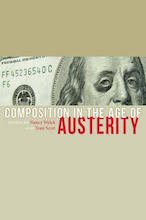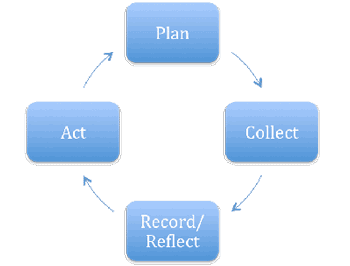

One of the disputes raised within critiques of neoliberalism by literacy educators and advocates is the question of assessment. What, exactly, is valued in the work of literacy and composition? While critiquing Irv Peckham's (2012) explanation of an outcomes-based test to his dean, contributor Chris Gallagher noted that Peckham "accedes to a managerial logic" rather than "arguing that first-year writing is a valuable experience for all students and therefore worth paying for" (p. 24, italics in original). While we might certainly desire first-year writing for all students just as we might desire physical education or art or computer science experiences, Gallagher takes the experience itself as an inherent good. Similarly, in her closing reflection, "Afterword: Hacking the Body Politic," Lil Brannon reiterated Gallagher's claim that composition offers unique experiences unavailable elsewhere. Like Gallagher, she left assumptions about that experience unexamined. What makes the composition experience so unique?
Gallagher's argument was an explicitly Deweyan one, in which "we are expert shapers of educational experiences for individuals and groups" (pp. 30–31) and have the prerequisite knowledge to "build environments and experiences that promote students' learning" (p. 31). This seems rather assumptive of a host of things Kairos readers might already be focusing on in their own classrooms and scholarship. Certainly digital tools and objects are part of our students' environments and learning. Inquiry into the outcomes of their use—indeed, some form of assessment of their potential at the very least—is how we shape our classes, curricula, and argue for those experiences. Further, to suggest that somehow composition teachers are already fully equipped masters of reaching into the lives of our students and transforming them into discerning citizens who can "make a life and… live well with others in a participatory democracy" (p. 31) seems a stretch. It is a laudable vision, but do we really want to put all that into a semester or two? And doesn't composition need to work with other subject areas like ethics, speech, sciences, and the arts? If we accept that we cannot go it alone, how else do we hold cross- and trans-disciplinary conversations, without talking about what we feel our students have learned by the end of our courses?
Gallagher’s implication that outcomes assessments are rarely connected back to the curriculum and pedagogy and Brannon’s description of a missed opportunity are both well founded. Yet, as Brannon mentioned in her afterword, when it came to formulating national outcomes,
The National Council of Teachers of English got into the game, seeking to set its own standards—which Barack Obama’s Secretary of Education Arnie [sic] Duncan then set aside in favor of new 'more rigorous' standards developed by a beltway think-tank funded by the National Governor's Association. (p. 222)
To listen to the way the issue is presented here is, I think, to suspect almost any assessment of capitulating to neoliberal market forces. So, while the opportunity was missed, I am not convinced it was missed because of inattention to ideology or lack of critical awareness about how literacy works, can be taught, or fits within the broader scope of education for civic, personal, and economic life. Rather, as Brannon also reiterated from Gallagher, "the field played along 'like good citizens' when mandates for outcomes and assessments started to emerge, but we were 'bamboozled'" (p. 226).

I make a point of these details in order to push back a little on the logic of the volume itself. Many of us are troubled by the direction of education in our country and decry the influence that can be had by moneyed interests, especially the reduction of what we do to functionalist measures while cutting budgets in areas like the arts, literacies, critical thinking, and humanities. But terms like "experience" and "neoliberalism" reference abstract, discursive constructs that contrast with the more concrete, ground-level work being hampered by social forces described in other chapters (see Impacts). Similar to the rhetoric Matthew Kirschenbaum (2014) detailed regarding digital humanities, such discursive constructs elide the material dimension of labor, the actual projects themselves in all their manifold diversity. Kirschenbaum critiqued a distinction between "textual scholarship" and "digital humanities" because that "speaks to no body" by virtue of it being "a catechism that makes sense only in the construct, that virtual discursive space where Morpheus and Neo (who are both really on the same side, remember) can battle without regard for bodies, history, or physics" (p. 13, italics in original). I think the discussion of neoliberalism does a similar thing, forgetting that not one path led us to our state of affairs and, perhaps, not one event can rescue us from it. A bit more pointedly, I think Brannon is right: we have been bamboozled by political leadership in America. Republican and Democrat alike have disregarded expert input despite sincere attempts to make it available for the common good.
Tony Scott defined neoliberalism in greater detail in a more recent article (2016), and I wish he and Nancy Welch had done so here or suggested that contributors unpack their own assumptions on this point. Neoliberalism is not, Scott explained in this recent essay, just the privatization of public services, but "the embedded commonsense principle that most spheres of human life are better perceived, managed, and evaluated as markets" (p. 14). Thus, assessment tools are geared toward language and perspectives that "had formerly been more contained within the realm of commerce" (p. 14). That explanation could have served this volume to help further its theoretical framework and, perhaps, clarify some of the critiques as well as help explain why experiences with certain kinds of texts, curricula, or pedagogies should be valued over others and in which contexts. Even good stances can lead to poor outcomes and potential misunderstandings. I do not see Scott and Welch clarifying that in this volume, which left me admiring Brannon's bamboozlement all the more. Our ills may not be entirely due to a certain way of thinking—a particular ideology to be detected through critical tools and exposed to disinfecting sunshine. Rather, our ills may be about certain individuals' self-proclaimed mantle of decision-making without "closing the loop" and vetting their own decisions with those who are affected. It's overreach and lack of accountability caused by plain old human ego, problems that can happen at any level of an organization, no matter the ideologies adopted by its members. And this is a very, very old—and very human—problem, one left largely unaddressed in the collection.
Continue to Impacts.